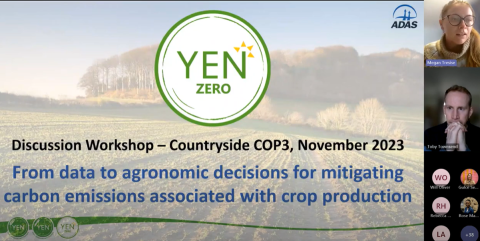To help growers calculate the carbon footprint of their crops and identify mitigation measures, the Yield Enhancement Network created a new farmer network called YEN Zero. YEN Zero provides analysis and benchmarking of combinable and forage crop carbon footprints on a per-field basis. This webinar introduces the work of YEN Zero with the ADAS Climate Change and Sustainability team and Will Oliver, an arable farmer from Lincolnshire and YEN Zero member.
04:24 - 'Introduction to YEN Zero' by Megan Tresise, ADAS Climate and Sustainability Consultant
16:48 - 'Reducing nitrogen emissions from crop production' with Toby Townsend, Senior Climate and Sustainability Consultant with ADAS
44:02 - YEN Zero Growers perspective with Will Oliver



